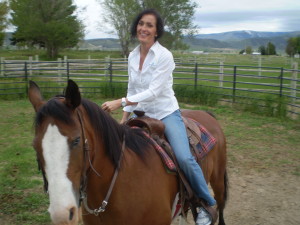Receiving criticism does not have to be hard. If we practice this strategy we will be able to diffuse the critic and gain deeper understanding. With this understanding we will be able to have win/win outcomes.
Category Archives: Leadership Skills
Linda’s Tip of the Week: Parades, Fireworks and Rodeos
Happy July 4th! It takes a team to be successful! Who is on your team that you need to acknowledge?
True Joy
Where do you find the most joy? What is joy to you? I am not referring to happiness. Happiness is a piece of joy. True joy typically involves another person besides us. Because of our inherent need to feel accepted, we need to have positive relationships with others.
You have probably heard it said that you have to give in order to get. But what about the principle of just giving, (what I will refer to in this article as charity)? What is charity? Do you know others that possess charity? What makes you drawn to that person? Let’s explore these questions, and through that exploration be able to find the secret to charity.
In Merriam-Webster’s Online Dictionary charity is described as the following: benevolent goodwill toward or love of humanity. The alternate description is: lenient judgment of others. Supreme charity is not an act but a condition or state of being.
Now that we have defined charity there are probably individuals that come to your mind. This state of being helps you endures all things. It is not easily provoked and it is patient. By exemplifying this trait we will attract goodness and prosperity into our lives. Let me share an example of one of the individuals in my life that continues to be someone that carries this enduring trait.
Her name is Anita. She was raised in a small town out west and grew up in a small family. She probably became a charitable person due, in large part, to the example of her mother. Anita has always given individuals the benefit of the doubt in her dealings with them. She has been patient when those closest to her have disappointed her. She has opened her home to strangers from different lands when it wasn’t convenient for her to do so.
She thrived professionally because she understood that her co-workers were human and that love and patience will make us all successful in the end. Because of her charitable nature, she attracted others to her. We all like to do business with people we like and who we feel truly likes us. Lastly, she has shared her mental, physical, emotional and financial resources to help others through their time of need or to help them achieve their goals.
I have seen Anita forgive others that have used or abused her, and in return she has loved and cared for them in very personal ways. I am grateful to have her as someone I can look to as an example. We all need these individuals in our lives. They give us hope, and teach us that goodness is within all of us.
By being charitable we purge ourselves of selfishness. I believe by ridding ourselves of selfishness, we are able to be more open to what life has to offer us and the opportunities that are there to capitalize and experience joy. If we are closed and don’t give, we limit our potential to achieve our goals and reach the success we dream of. With this trait we are able to expand our network.
It has been stated that successful individuals are “go givers.” They look for opportunities to give of themselves and their resources. They understand that true joy comes in giving. Why do the holidays bring out the best in everyone? Some would argue that they have become so commercialized, but I would argue that in the end people feel good because they are losing themselves in the thoughts and actions of serving others.
Charity is not the trait of someone who lets themselves be walked on or taken advantage of. Some people probably would associate charity as being weak. I disagree. It takes a strong individual who can find the good in every experience in life and the lesson to be learned.
In business, the opportunity to show charity can have long lasting effects and implications. How could you show more charity in your work? First, outline what is acceptable and not acceptable behavior for dealing with all groups such as clients, partners and employees. By developing a code and enforcing it, those who experience your entity will discover that you say what you mean and mean what you say.
By being involved in the community and providing goodwill you will attract more business and true joy in your professional life. Those organizations and individuals that understand the timeless principle that giving is better than receiving are open to change and have the ability to maneuver through trials or upsets.
Giving is one of the ways that we can breathe confidence into our organizational lives. Even as an individual we reap the benefits of giving. I have personally found that when I give, the joys, and often time’s tangible rewards, are tenfold. Being known as a “go giver” will open doors and improve your results in all you attempt to do. True joy is when we lose ourselves in the service of others.
Linda’s Tip of the Week: Listening Builds Confidence
If you want to have more confidence practice listening! Listening builds confidence. Listening also helps you become a more effective leader.
We want to be around confident individuals. When we are around confident individuals, we feel more at ease.
We all love to connect with individuals in organizations who truly listen to us. We can create a more successful and fulfilling life when we practice active listening.
You can tell when others are not “really” listening. To be an effective listener, the individual needs to feel he/she understands. This lets the one speaking feel validated and important.
Swallowed Pride
As I dialed the phone number my heart was racing. This was a phone call I never dreamed I would be making. Swallowing my pride I began to tell my parents the latest news; my family had to move because we had financially taken too much on and we would be losing our home.
That phone called happened over 10 years ago. Now we are living in part of the country that we never thought we would and achieving financial goals that we only dreamed about. When adversity hits us it can be a gift. This gift of swallowed pride can teach us and help us grow.
Thomas S. Monson stated “decisions determine our destiny.” I continue to see this day after day, month after month and through the years that march on. Even the smallest decision can impact what our future brings us. What we can learn from this is that having a plan, and being educated about the consequences of the plan, will help guide our journey.
What do you want your destiny to be? What decisions today are putting that destiny in jeopardy?
Disappointments come, that is a part of life. What we do with the disappointments and how we let them affect us is what develops our character and gives us stories to tell.
I would never have thought 10 years ago that I would be living in a warm climate, which my personality and temperament thrives in. I watched as my family grew closer, my marriage was saved and my career exploded all due to something at the time I was judging as a misfortune. The human tendency is to ask, “why me?” but if we can turn that around and pursue “what can I learn from this?” instead, then we grow and are strengthened.
There is a brighter tomorrow and by putting pride aside we will discover more about ourselves and our world then we could ever have imagined.
Straddling the Fence

I was raised on beautiful farmland in southeastern Idaho, I had many occasions where I found myself straddling a fence. We had a couple of different types of fencing on our large farm and ranch.
We had electric barb-wire fences on our property. It was pretty tricky jumping over them and not getting shocked. I learned pretty fast how not to touch the fence. Then as I got older, my parents invested in these beautiful white wood fences. They were tall enough that the horses couldn’t jump over and low enough that the calves from the cows couldn’t crawl under.
When climbing over that white fence I could straddle or sit on it. This gave me a higher perspective. I could watch what was happening in the corral.
Like the fence, there are moments in our personal and business lives where we are indecisive. We may question whether to “cross” the fence, sit on the fence or go back the way we came. There is a saying that is true, “you’re either sliding or climbing but never standing still.”
Once you have decided to head down a particular path, you have begun the commitment process. If we make a commitment and pursue that course of action we will feel like we are climbing because we took the action. When we stop and take no action then we begin to slide. We can always change course but the beauty of that is we are still climbing because of the action.
In my office hangs a picture with the word commitment on it. The quote, “determination is often the first chapter in the book of excellence” is under the word commitment. The picture is one of a runner in the early hours of the morning and set in a wooded rough terrain.
The reason I selected this picture was that I knew there may be days that are tough or hard. There would be days I would want to quit. But the runner in the picture reminds me of a goal I had and completed several years ago of running in every state of the country. Not only does the picture remind me of that goal I accomplished, it inspires me to stay focused on my new goal.
Sometimes I may try to straddle the fence but when I do I feel like my confidence is diminishing and my power as well. Taking action and striving for improvement has produced positive results.
All you have to do is climb the fence and explore the other side.
Perception Becomes Our Reality
 A few weeks ago my daughter, husband and I were discussing customer service. My daughter and husband were sharing experiences from their work days of how the customers they were dealing with would ask obvious questions or demand unreasonable requests. My daughter quipped that she had an idea for a comedic handbook on delivering customer service to individuals who test the limits of the customer service professional.
A few weeks ago my daughter, husband and I were discussing customer service. My daughter and husband were sharing experiences from their work days of how the customers they were dealing with would ask obvious questions or demand unreasonable requests. My daughter quipped that she had an idea for a comedic handbook on delivering customer service to individuals who test the limits of the customer service professional.
I found all of this conversation interesting because I too have been in the business of delivering customer service for over 30 years and have written numerous articles about the elements of great customer service. What I found most interesting in this conversation was we each had different perspectives. When we are delivering customer service it really doesn’t matter what the giver perceives rather what the receiver interprets.
The more we can put ourselves in the mindset of those we are trying to serve the more effective we will be. How do we get ourselves in the right mindset? We may find some days it’s easier than others. One of the best ways to keep our minds in a positive state is to look for the good in the person we are trying to serve. If we have the assumption that this next customer is going to be a challenge, then guess what? The experience will end up that way.
It is important to remember that this may be the 50th person today you have told the same information to, this is the first time this individual has heard it today. There is an art to staying engaged and pleasant. I find that when I’m taking care of myself, with enough rest, hydration, nutrition and exercise I’m on my game and the game is a positive experience.
For some individuals, keeping your cool or not becoming sensitive may be a challenge. The old saying of counting to ten in your head really works. The more we can keep our perspective as close to the perspective of those we are trying to serve the more successful we will be.
Giving service is something we all do in a variety of ways. On the flip side we are all recipients of service. There have been times when I have been frustrated with the service I am receiving. The more I communicate my position and try to put myself in the position of the individual giving me service, the easier it has been to let go of the frustration and experience a positive outcome. What we perceive becomes our reality. The objective then is to control our perception.
Looking for the win/win to every experience will put joy in our heart and money in our pocket.
Servant Leaders

Last week in the article “The Extra Mile”, the reference “servant leader” was used to describe the general manager of a historical hotel where I had one of the most memorable service encounters of my life. So that you can see I keep my promises, let’s explore together what a servant leader typifies.
What comes to your mind as we use the term “Servant Leader?” Do you have a positive reaction to the term or do you believe it describes someone with weak qualities? I have found some of the individuals in my life who are my heroes, own this time-honored and obtainable, guiding value. To be a Servant Leader you recognize those whom you serve are the most valuable asset to your organization. Your job is to enable those you oversee or lead to be able to do their job to the highest degree.
Servant Leaders have many attributes. Some of the most important attributes they have is the ability to inspire, lift and empower those they lead. I love the word inspire. This word means to give breath or life. Think back with me on those who have inspired you the most throughout your life. Hope this brings a smile to your face. These individuals are willing to put others ahead of themselves. They understand if we seek each other’s interest we all prosper rather than just the individual.
Perhaps you are trying to learn how to be a Servant Leader but are afraid you are giving up control. The highest form of control is self-control. When you exercise self-control, you have the ability to determine how you will react in any given situation. Let me share with you an experience by Frank Koch from The Naval Institute magazine, “Proceedings.”
Two battleships had been on training assignments at sea for several days in extreme weather conditions. Frank Koch was serving on the lead battleship and was standing watch on the bridge as nightfall came. Due to poor visibility and patchy fog the captain remained on the bridge overseeing all the activities.
Shortly after dark, the lookout on the wing of the bridge reported, “Light, bearing on the starboard bow.” The captain asked, “Is it steady or moving astern?” Lookout replied, “Steady, captain,” which meant we were on a collision course with the other ship. The captain then ordered the signalman, “signal that ship: we are on a collision course, advise you change course 20 degrees.” Back came a signal, “advisable for you to change course 20 degrees.” The captain said, “I’m a captain, change course 20 degrees.” “I’m a seaman second class,” came the reply. “You had better change course 20 degrees.” By that time, the captain was furious. He spat out, “I’m a battleship. Change course 20 degrees.” Back came the flashing light, “I’m a lighthouse.” The battleship changed course.
Lighthouses don’t move. Guided by principles and laws. We have the privilege of developing qualities. By following guiding principles if developed from our conscience, will not run us to dry ground.
We can become the type of individuals who will inspire others to be the best they can be and provide exceptional service. The more you practice following your conscience the stronger it will become. The result will be one of pleasure and prosperity throughout all areas of your life. True joy comes from positive interactions with others. May you have the courage to listen and obey your conscience throughout your life and to be able to teach others to do the same.
The Extra Mile

The Extra Mile
A colleague and I were meeting in my office and he made a comment about a plaque hanging on the wall. This plaque has a doorknob protruding out from it and he asked what the story was behind the doorknob. This question brought a smile to my face as I recounted to him why and how I was presented with this honor.
This doorknob is a relic from a historical hotel in Cincinnati, Ohio. The beautiful hotel hosted several past United States presidents and Hollywood actors such as Marilyn Monroe, Judy Garland, The Beatles, and a multitude of others throughout the years. The reason they gave me this beautiful recognition plaque was because I was involved in bringing a new revenue stream to their already successful organization.
As I shared this story, my memory was reignited about the incredible service our group received while staying there. It all started when I entered my suite.
The General Manager would be labeled today as a “Servant Leader.” We will cover that term and what it all entails in next week’s issue. As I entered my suite after a long travel day, he was actually doing some last minute touch-up vacuuming and overseeing my arrival.
In all the travel that I have done throughout my years, this was a first! We soon came to understand that this was not a first for him or this organization. At every turn whenever we needed something they delivered, and if they could not deliver they would let us know and offer alternatives. He especially was very good at anticipating our needs. While discussing logistics on a daily basis he would hover closely and really listen to what we were saying to see if his organization could go the extra mile.
That week was one of the most enjoyable experiences in my professional life. The entire organization was courteous, respectful and discreet as they performed their individual roles. It made me contemplate how they made this a part of their culture and how they instilled in new employees this value of great service.
It obviously started at the top and was expected of everyone in his or her respective role. I asked this General Manager about how they handled those who did not comply. He told me they exercised discipline with their performance evaluation and feedback system. Individuals were warned and if the expectation was not met they were fired. I have often thought back on that conversation.
What can you take away from this experience? I learned that if I expect certain behaviors from those individuals in my life that I lead, whether it is professionally or personally, I must set the tone and the example. We can also take away that discipline is key to success. How often do we let things go or rationalize people’s behavior? Perhaps if we start expecting exceptional service we will start to see that happening time and time again in our lives.
Is it hard to go the extra mile? Not really, if you expend just a little more effort, the rewards could potentially be tripled, if not more. Others may or may not see your efforts, but deep inside you will know that you were true to your internal compass. That will breed happiness and peace throughout your life. May you have the courage to push yourself to go the extra mile and enjoy the results of your labors!
Service and Chopsticks
What do chopsticks have to do with service? 
Last week we explored elements of a positive service experience for both the giver and the receiver. Today I was pondering how you would teach good service to an employee or an individual that you are trying to mentor even if that person has never good experienced service before.
It would be hard for them to deliver exceptional service if they had not experienced exceptional service before. They would not know what to do when confronted with the different types of service scenarios that could occur, so there would be a disconnect or missing link for that individual.
One great way of teaching is leading by example. One way to get your students to learn is to get them to teach you. While eating lunch with chopsticks one day I was contemplating this learning by teaching and it reminded me of a personal experience when I thought I would never be able to learn, as I had instructor after instructor try to teach me.
The story goes like this – I was raised on an Idaho farm and ranch. I spent my summer competing in rodeo events, driving cattle and pulling weeds in the sugar beet fields. Eating out was a true luxury because the nearest town was a good distance away and I have five brothers and two sisters. When we did eat out, it was typically a hamburger stand.
On very special occasions my parents would go to a Chinese restaurant that was 50 miles away. A few of us kids got to attend a couple of those occasions and because I was naïve to the tastes of different ethic foods, I always opted for the one “American” dish on the menu. After one of those dinners, I remember my Mom serving some of the leftovers and I thought I would try a bite and you guessed it, I was hooked! Oriental food and all its varieties now happen to be one of my favorite foods. I love to cook them, smell them, and lastly eat them!
As I moved away from home and started my adult life I was traveling all over the country and when I would have oriental food the people I was with or the wait staff at the restaurant would try to teach me how to use chopsticks. This went on for twelve years. Every new person that I had oriental food with would try to teach me their way of using chopsticks.
One evening I was dining alone and sitting at a Sushi Bar and got into a conversation with a gentleman about chopsticks, he said: “Linda, just pick them up in your hand, don’t think about it, and practice picking up the larger pieces.” I tried, missed, tried several more times and finally as time went on, I was eating with chopsticks and today can even pick up a grain of rice.
What does this teach us? First off, when you have experienced something that someone is trying to teach you, and you try their way exactly you may not ever get it right. You may find that with applying your own unique style, your outcome is the same or perhaps better when a variation on the skill was implemented. Also, we learn that we each are given innate hardware.
Even if we have never experienced great service in our lives, the ability to give great service can be learned and can be delivered with our own style and signature. The best way to learn something is to teach it – so with those you lead or have stewardship over get them to teach you what great service is to them and they will deliver far above your expectations.
We are born with a birthright to succeed that applies to giving great service and even learning how to use chopsticks!


